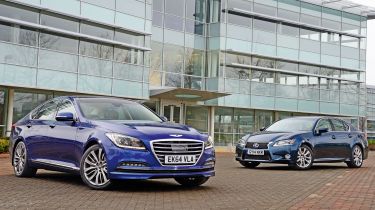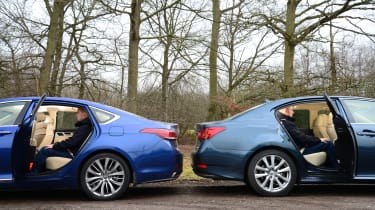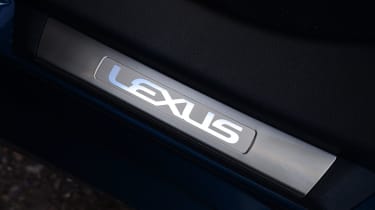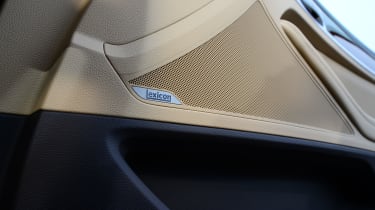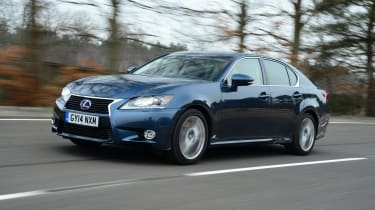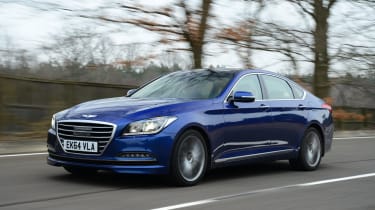Social climbers: Hyundai Genesis vs Lexus GS
Hyundai’s new Genesis and the Lexus GS aim to shake up the exec elite. Do they make the grade?
For decades, the executive saloon class has been dominated by upmarket German cars. However, in recent years, a number of ambitious brands from outside Europe have attempted to cash in on this lucrative sector.
Perhaps the boldest effort yet comes from Hyundai, which has just pulled the wraps off its latest Genesis saloon. Already a familiar sight in its native Korea and the US, the luxury four-door has now made its way on to UK soil for the first time.
Featuring a roomy interior, an extensive list of standard kit, a powerful V6 engine and suspension specifically tuned for British roads, the newcomer certainly has all the bases covered. And with an eye-watering price tag of £47,995, it demands to be taken seriously.
One of the few non-European makers to have cracked the executive market is Lexus. Its hybrid-powered GS models deliver class-leading emissions and build quality, plus they’re refined, comfortable and well equipped.
So, do either of our contenders have what it takes to make buyers sidestep the executive elite?
Click the links above to read individual reviews, and scroll down to see which alternative executive car comes out on top...
Head-to-head
Back seats
The Hyundai’s wheelbase is 155mm longer than the Lexus’, making for more rear legroom. However, both cars feature a front passenger seat with a ‘chauffeur’ function that allows those in the back to remotely move it forward to create more room, plus a rear bench that slides and reclines for extra comfort. Our duo also feature standard heated rear seats, but only the Genesis has a cooling function.
Customer service
Lexus came top of our Driver Power 2014 satisfaction survey for dealer service, so your car should be in safe hands when it goes in for a check-up. Hyundai’s sales network finished in 13th, but as only seven dealers will be authorised to sell the Genesis, customer care should be excellent.
Sounding off
Both our contenders get high-end sound systems as standard. The Hyundai’s 500W 14-speaker unit is produced by Lexicon, while the Lexus has an 835W Mark Levinson set-up with 7.1 digital surround sound. Interestingly, both hi-fi brands are owned by American company Harman International.
Verdict
1st place: Lexus GS
The GS 450h costs more to buy than the Genesis and doesn’t come as well equipped, but it’s a more polished performer and its hybrid powerplant delivers significant savings. It’s also beautifully finished, refined, spacious and is backed by one of the best dealer networks around. It still lags behind the best European models, but is an attractive and accomplished alternative for buyers who don’t want to follow the herd.
2nd place: Hyundai Genesis
You can’t fault Hyundai’s ambitions, and the new Genesis proves that the brand is capable of rivalling upmarket makers for quality and hi-tech kit. However, the car lacks the sophisticated driving experience that’s expected in this class, and by aping European design cues, it doesn’t have any real identity. The good news is that this car’s quality and kit will filter down to more affordable models.
Key specs:
| Lexus GS 450h Premier | Hyundai Genesis | |
| On the road price/total as tested | £51,495/£52,105 | £47,995/£47,995 |
| Residual value (after 3yrs/36,000) | £16,427/31.9% | N/A/N/A |
| Depreciation | £35,068 | N/A |
| Annual tax liability std/higher rate | £2,155/£4,130 | £3,280/£6,559 |
| Annual fuel cost (12k/20k miles) | £1,914/£3,191 | £2,942/£4,904 |
| Ins. group/quote/road tax band/cost | 42/£548/F/£145 | 42/£469/M/£500 |
| Cost of 1st/2nd/3rd service | £275/£445/£275 | Free (5yrs/100k) |
| Length/wheelbase | 4,850/2,855mm | 4,990/3,010mm |
| Height/width | 1,455/1,840mm | 1,480/1,890mm |
| Engine | V6/elec motor/3,456cc | V6/3,778cc |
| Peak power/revs | 341/6,000 bhp/rpm | 311/6,000 bhp/rpm |
| Peak torque/revs | 352/4,500 Nm/rpm | 397/5,000 Nm/rpm |
| Transmission | CVT/rwd | 8-spd auto/rwd |
| Fuel tank capacity/spare wheel | 66 litres/foam | 77 litres/space saver |
| Boot capacity | 451 litres | 493 litres |
| Kerbweight/payload | 1,825/510kg | 1,890/580kg |
| Turning circle/drag coefficient | 10.6 metres/0.27Cd | 11.4 metres/N/A |
| Basic warranty (miles)/recovery | 3yrs (60,000)/3yrs | 5yrs (unltd)/5yrs |
| Service intervals/UK dealers | 10,000 miles (1yr)/51 | 20,000 miles (1yr)/7 |
| Driver Power manufacturer/dealer pos. | 4th/1st | 18th/13th |
| Euro NCAP: Adult/child/ped./stars | N/A | N/A |
| 0-60/30-70mph | 5.9/5.2 secs | 6.4/5.6 secs |
| 30-50mph in 3rd/4th | 4.0/5.7 secs | 3.4/4.7 secs |
| 50-70mph in 5th/6th/7th/8th | 8.0/11.1/14.1/15.7 secs | 5.6/7.1/10.7/14.3 secs |
| Top speed/rpm at 70mph | 155mph/1,500rpm | 150mph/1,750rpm |
| Braking 70-0/60-0/30-0mph | 48.6/35.9/9.1m | 45.9/34.0/8.6m |
| Noise outside/idle/30/70mph | 63/43/57/67dB | 59/39/57/65dB |
| Auto Express econ (mpg/mpl)/range | 30.8/6.8/447 miles | 20.0/4.4/339 miles |
| Govt urban/extra-urban/combined | 42.2/51.4/46.3mpg | 18.0/32.8/25.2mpg |
| Govt urban/extra-urban/combined | 9.3/11.3/10.2mpl | 4.0/7.2/5.5mpl |
| Actual/claimed CO2/tax bracket | 212/141g/km/21% | 326/261g/km/35% |
| Airbags/Isofix/HUD/camera | 10/yes/yes/yes | Seven/yes/yes/yes |
| Auto box/stability/adap. cruise ctrl | Yes/yes/£3,350 | Yes/yes/yes |
| Climate control/leather/climate seats | Yes/yes/yes | Yes/yes/yes |
| Metallic paint/xenon lights/sunroof | £610/yes/£1,000 | Yes/yes/yes |
| Sat-nav/USB/DAB radio/Bluetooth | Yes/yes/yes/yes | Yes/yes/yes/yes |
